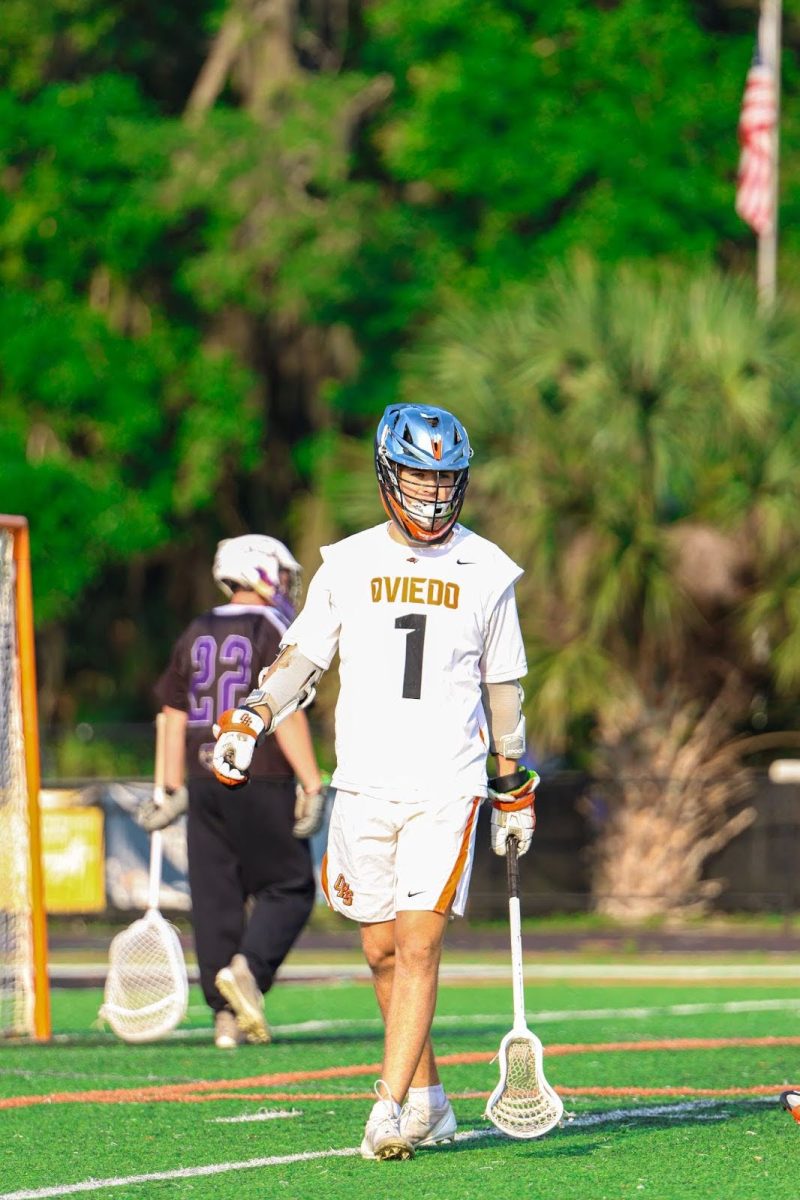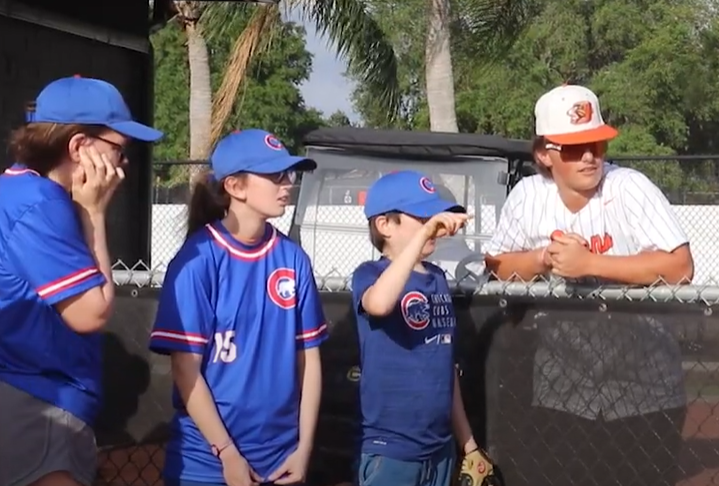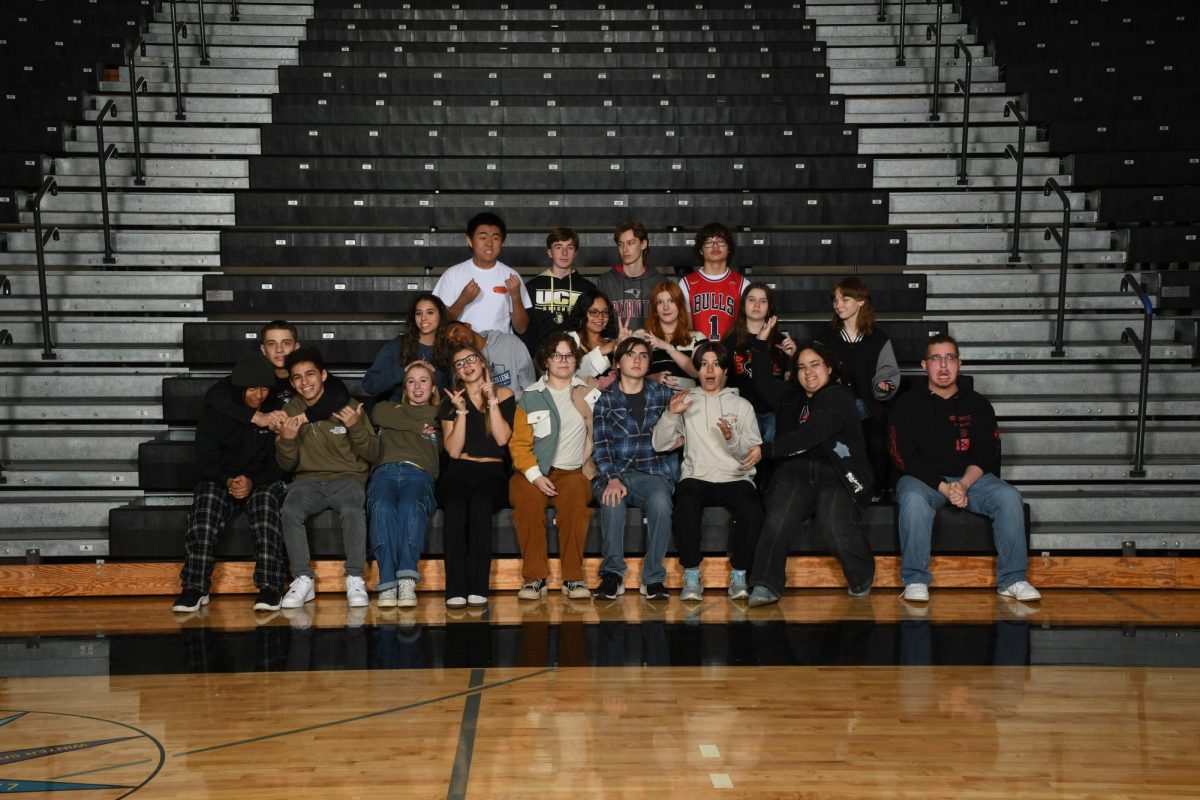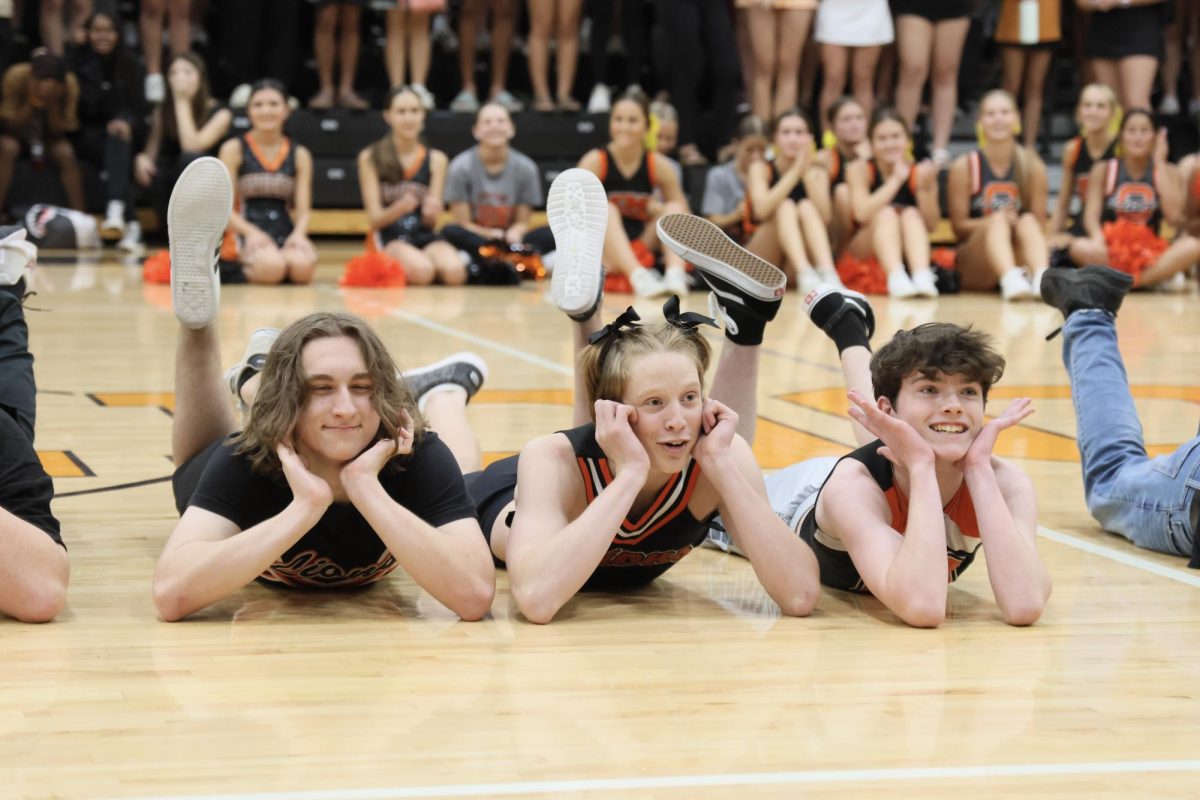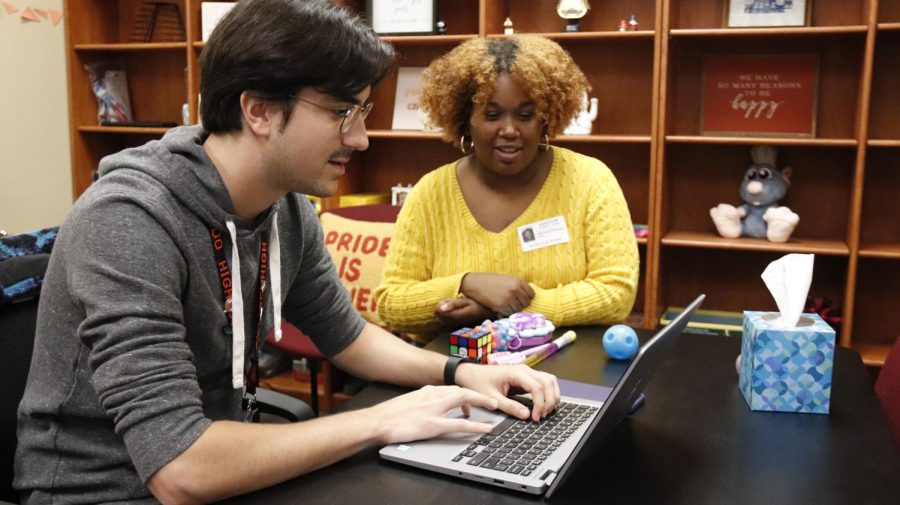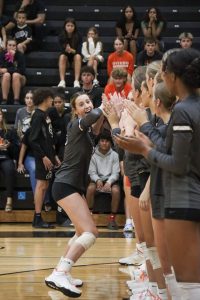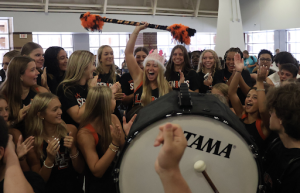Opening a door to mental health support
School Social Workers Kevin Baluja and Sterling Ramsey work together in the front office of Oviedo High School. They leave their door open to counseling while they manage other tasks on the computer. Photo by Logan Hayes.
April 7, 2023
A student stands in front of a door – a bridge between them and the office of a social worker with his intern. Cold sweat drips down their spine, hand shaking as they turn the handle. But instead of being met with a bland, uninviting room like often imagined, the office is full of colorful plushies, pillows with positive phrases, and warm smiles greeting the student.
This is the office of Kevin Baluja and Sterling Ramsey.
Baluja is a school social worker and Ramsey is an intern. Typically, school social workers transfer between locations on a rotational basis. This allows the workers to reach a variety of students, although building proper chemistry with these students is difficult to sustain. As of this year, experimentally, social workers will stay at one location.
There is a team at Oviedo High School that consists of medical professionals, such as Baluja and Ramsey. Baluja manages general basic needs, such as attendance issues, as well as counseling. Ramsey attends the University of Central Florida in addition to her internship.
Baluja values the contrast between counselors and social workers.
“A social worker views a person holistically. They look at your personal life, your school life, your relationships – they want to get to know you and support you in all those ways,” Baluja said.
Counselors are the frontline to students who need support, but they are not the only option for service. Students may reach out to other personnel if they do not feel comfortable with their assigned counselor for mental health support.
“I think that the school is doing what they can,” Noah Powers, 11, said. “The school doesn’t know who needs help, but they make it very clear that we have a system available for students who are struggling mentally – that they have somewhere to go and someone to talk to.”
According to the Florida Department of Education, $140 million were funded towards the Mental Health Assistance Program and $39.4 million for additional care services.
There are services available to students. What is called the ‘referral dashboard’ is a system that lets the staff know which students are requesting a meeting. It is not the stereotypical referral that implies disciplinary action. A referral simply means someone being referred to by someone else. The level of care and resources needed are then set in order by staff.
The team at OHS leave their doors open for those who seek counseling. Some households make it so that students feel uncomfortable expressing how they feel, or if they need help. Medical professionals have studied in their field so that they can find an approach that will help others thrive.
“Sometimes we kind of think black-and-white, but there’s a whole lot to not just being students, but as humans,” Ramsey said. “We’re very complex creatures, we have a lot going on, and that’s why I really love this job.”
Ramsey grew up participating in community service and doing volunteer work. Her mother raised her this way: to give the good that you receive back. She used to visit her school social workers for help and they made a massive impact on her life. Just as her mother taught her, Ramsey is returning this help to students that need it. Through UCF, Ramsey is working to receive her bachelor’s degree in Psychology and then her next step will be receiving a master’s degree.
“I am not here to impose my perspectives, my beliefs, the way I feel, the way I would treat a situation – I don’t impose that on anybody. All I’m here to do is to listen to you guys and navigate it with you,” Baluja said.
As with Ramsey, Baluja went to his school social worker for support. When they would have a meeting, his day would become a little brighter and a weight would fall off from his chest. Rather than a normal therapist, his social worker would view him as a person holistically. These ‘holistics’ are the center of social work, meaning looking into the layers of the person for the factors that contribute to their overall health: physical, mental, social, and spiritual wellbeing.
In their office space, snacks and water bottles are available for students in need. The room is decorated with figures such as Remy from Ratatouille, inspirational quotes on posters, a mirror with positive reinforcements, and there are fidgets toys on the table. The working duo understand that students need a welcoming safe space, especially when discussing difficult topics.
“My best advice for any student is that there are things we want to go through alone and there’s things we don’t know who to go through with it. You don’t know what you’re experiencing,” Baluja said. “Just like if you’re lost in a city, you may need a tour guide. Just like when you’re lost with your emotions, you may need an emotional guide.”
Ramsey is working as an intern with Baluja to enhance her skills that she will use as a social worker. This means asking the right questions, actively listening, empathizing with students, and understanding human relationships. The goal is to view the individual holistically.
Many students are intimidated by the thought of having to speak to officials. The idea of repercussions or legal action supervening is a daunting thought. The majority of students believe that this is guaranteed to happen if they say the wrong thing to a social worker or counselor.
“The only counselors that felt helpful were the New Horizons counselors,” said Wakim. “Having more of them could definitely help students feel more open and safe to talk to someone.”
The waters of confidentiality can appear murky. The right to confidentiality means that whatever is said in the room, stays in that room. The limitation is if the student has the intention to harm themself or someone else, or if a situation is life-threatening. If the right professionals are contacted, they will explain the ground rules of confidentiality before the discussion is opened.
“Confidentiality means that you’re really in the driver’s seat,” Baluja commented on the concern. “The majority of time, when heavy topics come up, students will ask questions like, ‘if I were to talk about this, what would you have to do?’ And I’ll answer you straight up if I have to make a report about that.”
Throughout the school year, select Thursdays are known as ‘Wellness Days.’ Third period is extended to allow students to watch a Nearpod covering a different topic every time. Covered subjects range from drug and alcohol use, to mental health, to social pressure. At the end of the lesson, a survey is mandatory for students to take to receive credit for participation. The last question is if the student needs mental health help. These surveys are sent to the counselors.
“I think the survey at the end asks students discreetly if they need to talk to someone. It’s a fantastic system because it allows students to ask for help without fear of embarrassment,” Powers said.
While the survey is a decent plan, many students are not convinced that Wellness Days are an efficient approach to addressing the situations that many students are in.
“They need to go more in depth on mental health issues and outlets that students can use. I believe that sitting in a classroom and listening to a monotonous video lecture on depression has a completely opposite effect than intended,” Ayalis Wakim, 12, said. “We need more access to mental health counselors that are specifically trained to handle mental health issues.”
Many students feel this sentiment, saying that the Nearpods are not interesting or bore them due to the long, unengaging segments. While the delivery of the lessons are informative, the execution is what matters. But the final survey does offer students an available route to ask for help. The fear of embarrassment is diminished when the right professionals are at your service. They understand the whys-and-the-hows of situations and will help navigate an individual with conflicted emotions, which sprout from the causes and effects of life.

![Prom king Colin Napier and queen Leah Hopkins dance the night away during the Golden Gala on April 26th. Prior to the prom, the Student Government must make many preparations over the course of months in order to ensure it goes off without a hitch. However, their work eventually pays off when it comes time for the dance. “We set up [the prom] the day before, and it’s horrible. We’re there for a very long time, and then we get our beauty sleep, and then we get ready for prom the next day,” Aubrie Sandifer said.](https://oviedojournalism.com/wp-content/uploads/2025/05/Oviedo-197-800x1200.jpg)
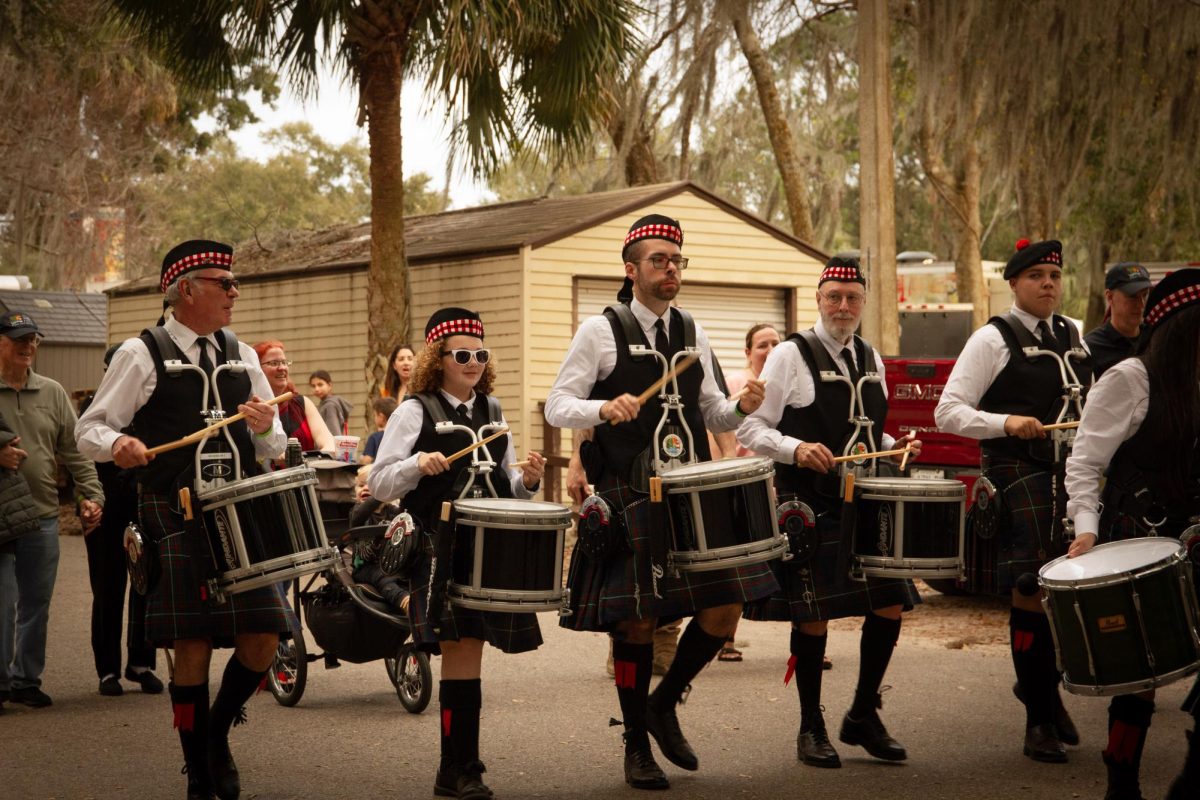
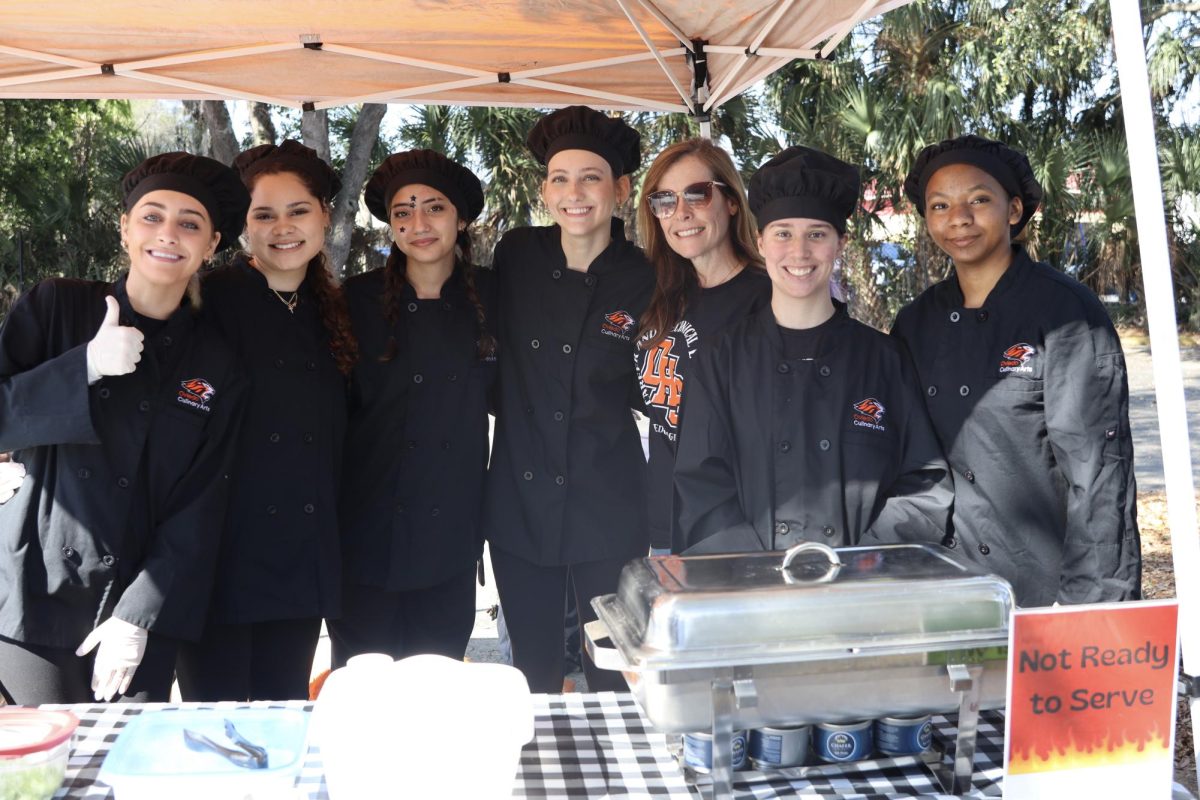
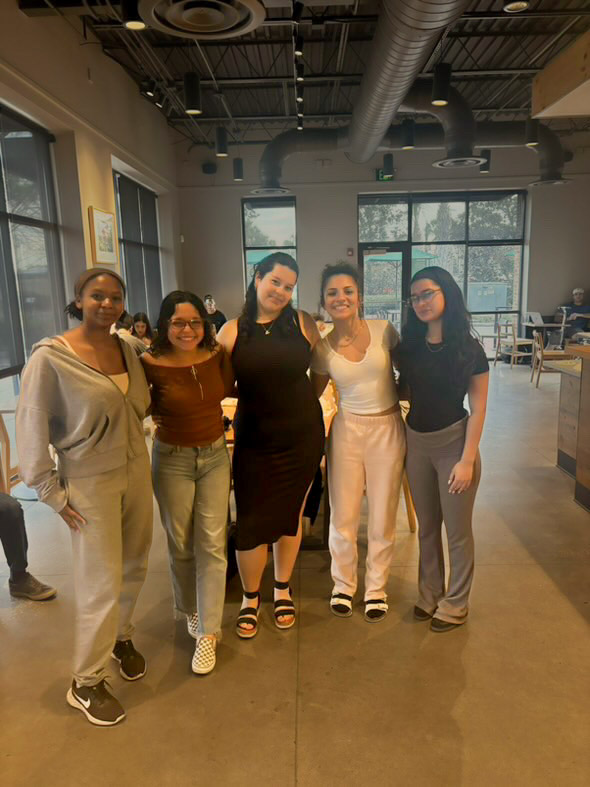

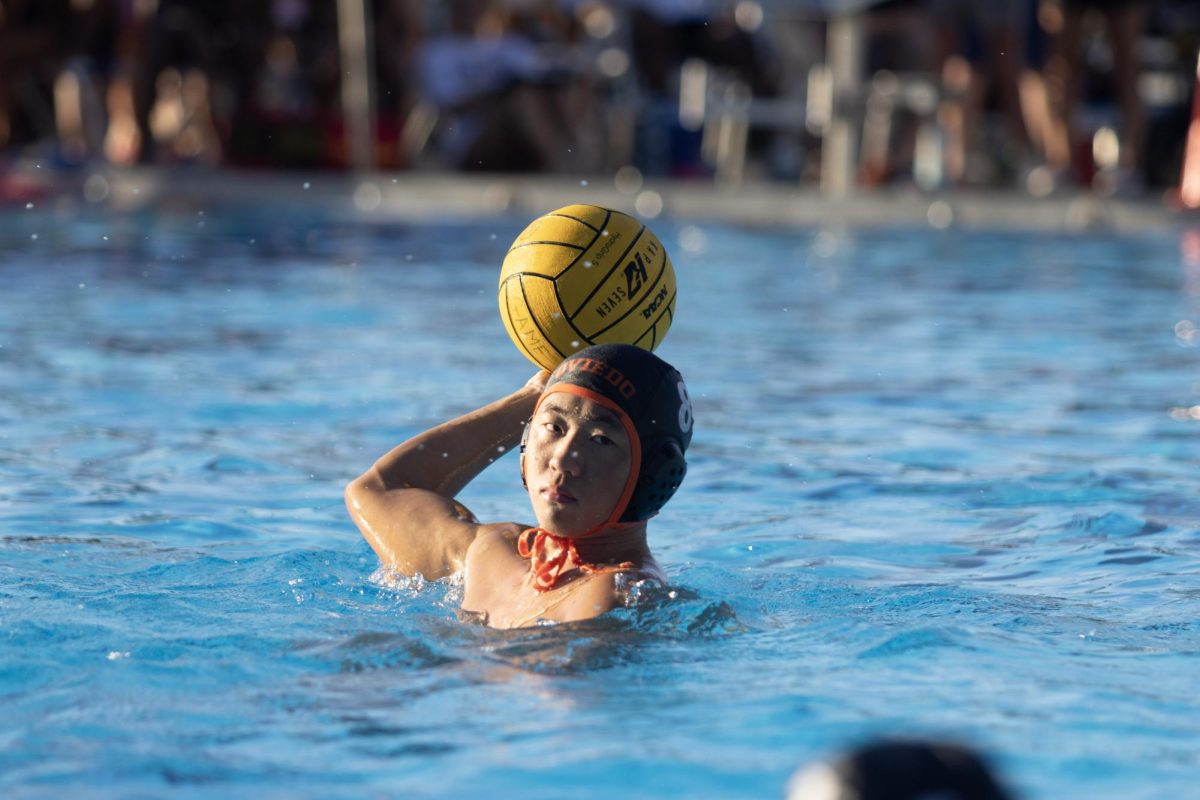

![Hopkins at Honor Grad with golf coach John McKernan. As Hopkins’ golf coach for the last two years he has seen Hopkins’ growth as a player and person along with their contributions to the team. “[Hopkins] has just been really helpful since I took [the golf team] over, just anything I wanted to do I ran by [Hopkins],” said McKernan.](https://oviedojournalism.com/wp-content/uploads/2025/05/B66A7760-800x1200.jpg)
